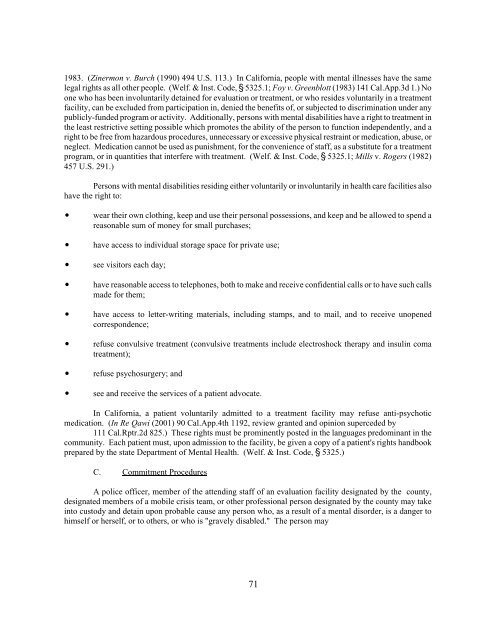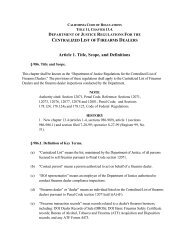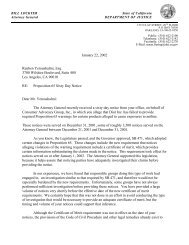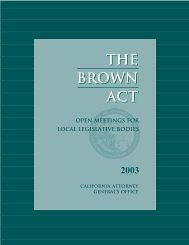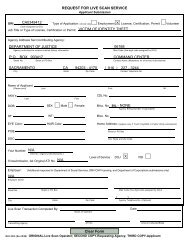Legal Rights of Persons With Disabilities - Ossh.com
Legal Rights of Persons With Disabilities - Ossh.com
Legal Rights of Persons With Disabilities - Ossh.com
You also want an ePaper? Increase the reach of your titles
YUMPU automatically turns print PDFs into web optimized ePapers that Google loves.
1983. (Zinermon v. Burch (1990) 494 U.S. 113.) In California, people with mental illnesses have the same<br />
legal rights as all other people. (Welf. & Inst. Code, ' 5325.1; Foy v. Greenblott (1983) 141 Cal.App.3d 1.) No<br />
one who has been involuntarily detained for evaluation or treatment, or who resides voluntarily in a treatment<br />
facility, can be excluded from participation in, denied the benefits <strong>of</strong>, or subjected to discrimination under any<br />
publicly-funded program or activity. Additionally, persons with mental disabilities have a right to treatment in<br />
the least restrictive setting possible which promotes the ability <strong>of</strong> the person to function independently, and a<br />
right to be free from hazardous procedures, unnecessary or excessive physical restraint or medication, abuse, or<br />
neglect. Medication cannot be used as punishment, for the convenience <strong>of</strong> staff, as a substitute for a treatment<br />
program, or in quantities that interfere with treatment. (Welf. & Inst. Code, ' 5325.1; Mills v. Rogers (1982)<br />
457 U.S. 291.)<br />
<strong>Persons</strong> with mental disabilities residing either voluntarily or involuntarily in health care facilities also<br />
have the right to:<br />
$ wear their own clothing, keep and use their personal possessions, and keep and be allowed to spend a<br />
reasonable sum <strong>of</strong> money for small purchases;<br />
$ have access to individual storage space for private use;<br />
$ see visitors each day;<br />
$ have reasonable access to telephones, both to make and receive confidential calls or to have such calls<br />
made for them;<br />
$ have access to letter-writing materials, including stamps, and to mail, and to receive unopened<br />
correspondence;<br />
$ refuse convulsive treatment (convulsive treatments include electroshock therapy and insulin <strong>com</strong>a<br />
treatment);<br />
$ refuse psychosurgery; and<br />
$ see and receive the services <strong>of</strong> a patient advocate.<br />
In California, a patient voluntarily admitted to a treatment facility may refuse anti-psychotic<br />
medication. (In Re Qawi (2001) 90 Cal.App.4th 1192, review granted and opinion superceded by<br />
111 Cal.Rptr.2d 825.) These rights must be prominently posted in the languages predominant in the<br />
<strong>com</strong>munity. Each patient must, upon admission to the facility, be given a copy <strong>of</strong> a patient's rights handbook<br />
prepared by the state Department <strong>of</strong> Mental Health. (Welf. & Inst. Code, ' 5325.)<br />
C. Commitment Procedures<br />
A police <strong>of</strong>ficer, member <strong>of</strong> the attending staff <strong>of</strong> an evaluation facility designated by the county,<br />
designated members <strong>of</strong> a mobile crisis team, or other pr<strong>of</strong>essional person designated by the county may take<br />
into custody and detain upon probable cause any person who, as a result <strong>of</strong> a mental disorder, is a danger to<br />
himself or herself, or to others, or who is "gravely disabled." The person may<br />
71


